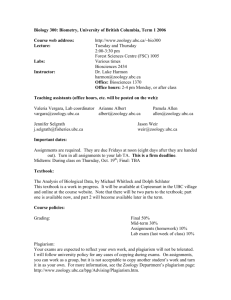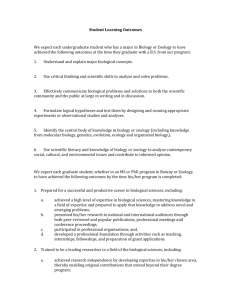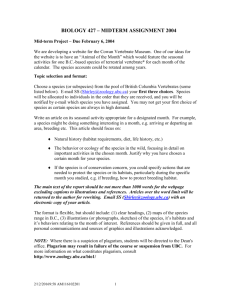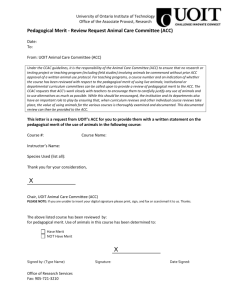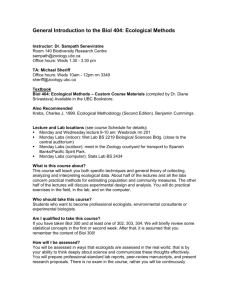Advancing Knowledge and Education through the use of Animals in
advertisement
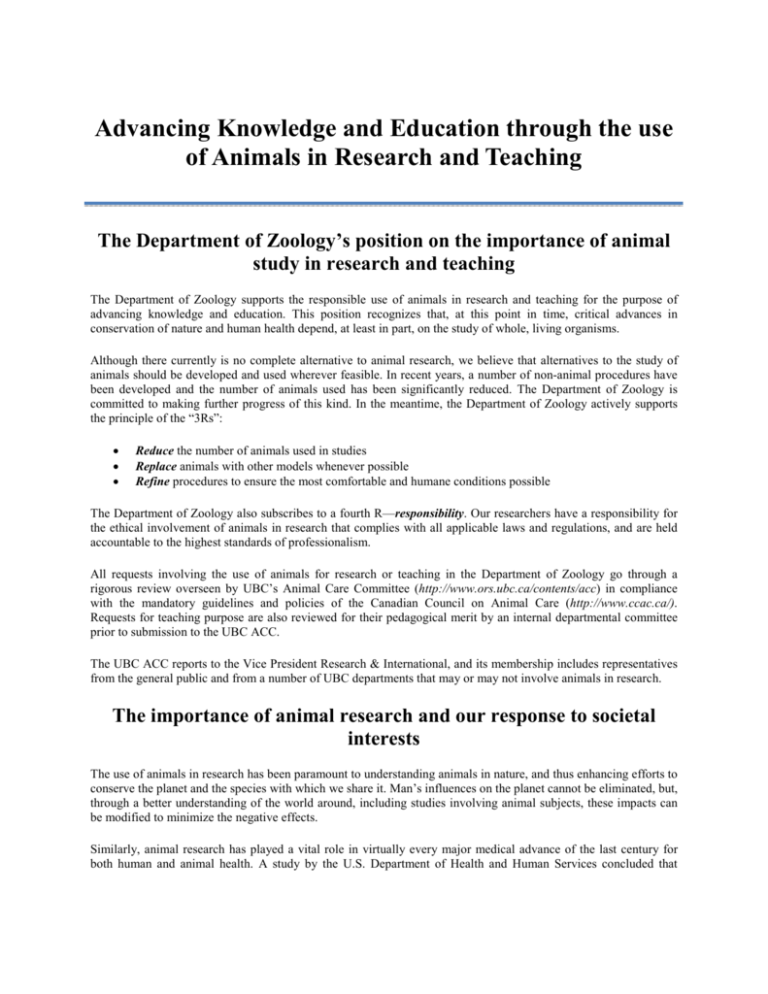
Advancing Knowledge and Education through the use of Animals in Research and Teaching The Department of Zoology’s position on the importance of animal study in research and teaching The Department of Zoology supports the responsible use of animals in research and teaching for the purpose of advancing knowledge and education. This position recognizes that, at this point in time, critical advances in conservation of nature and human health depend, at least in part, on the study of whole, living organisms. Although there currently is no complete alternative to animal research, we believe that alternatives to the study of animals should be developed and used wherever feasible. In recent years, a number of non-animal procedures have been developed and the number of animals used has been significantly reduced. The Department of Zoology is committed to making further progress of this kind. In the meantime, the Department of Zoology actively supports the principle of the “3Rs”: • • • Reduce the number of animals used in studies Replace animals with other models whenever possible Refine procedures to ensure the most comfortable and humane conditions possible The Department of Zoology also subscribes to a fourth R—responsibility. Our researchers have a responsibility for the ethical involvement of animals in research that complies with all applicable laws and regulations, and are held accountable to the highest standards of professionalism. All requests involving the use of animals for research or teaching in the Department of Zoology go through a rigorous review overseen by UBC’s Animal Care Committee (http://www.ors.ubc.ca/contents/acc) in compliance with the mandatory guidelines and policies of the Canadian Council on Animal Care (http://www.ccac.ca/). Requests for teaching purpose are also reviewed for their pedagogical merit by an internal departmental committee prior to submission to the UBC ACC. The UBC ACC reports to the Vice President Research & International, and its membership includes representatives from the general public and from a number of UBC departments that may or may not involve animals in research. The importance of animal research and our response to societal interests The use of animals in research has been paramount to understanding animals in nature, and thus enhancing efforts to conserve the planet and the species with which we share it. Man’s influences on the planet cannot be eliminated, but, through a better understanding of the world around, including studies involving animal subjects, these impacts can be modified to minimize the negative effects. Similarly, animal research has played a vital role in virtually every major medical advance of the last century for both human and animal health. A study by the U.S. Department of Health and Human Services concluded that animal research has helped increase our life expectancy by 20.8 years. Millions of people and a similar number of animals would suffer or die unnecessarily if animal research were to cease. It is simply not possible to eliminate animal research altogether and still produce new or improved treatments for disease, including those for humans, pets, livestock or wildlife The use of animals for educational purposes may sometimes be different in its objectives than the use of animals in research. While animals used for educational purposes may be used to discover, prove or develop new ideas and techniques, they may also be used to demonstrate established principles or to learn manual skills and techniques. The use of animals for the latter purposes must be based on sound ethical justification and proven educational objectives. There must be justification provided for the use of animals over the use of alternatives such as models, videos, computer simulations and emulations, etc. The Department of Zoology is committed to ensuring that research, training and teaching involving animals conforms to ethical, legal, and safety regulations and to the highest standards of animal care and treatment. Fulfillment of this commitment requires effective ongoing training and education of investigators, support staff, and students, as well as rigorous regulation and oversight of animal research. DEPARTMENT OF ZOOLOGY Guidelines and Procedures Use of Animals in Teaching and Training November 2012 A. Guidelines The Department of Zoology supports the responsible use of animals in teaching for the purpose of advancing knowledge and education. We believe that alternatives to the study of animals should be developed and used wherever feasible. In recent years, a number of non-animal procedures have been developed and the number of animals used has been significantly reduced. The Department of Zoology is committed to making further progress of this kind. However, there are many situations where the use of alternatives is not feasible - teaching and training in many areas of the biological sciences also depends on the study of whole, living organisms. Given this, the Department of Zoology actively supports the principle of the “3Rs” • • • Reduce the number of animals used in studies Replace animals with other models whenever possible Refine procedures to ensure the most comfortable and humane conditions possible The Department of Zoology also subscribes to a fourth R—responsibility. Our faculty have a responsibility for the ethical involvement of animals in teaching that complies with all applicable laws and regulations, and are held accountable to the highest standards of professionalism. B. Pedagogical Review All requests involving animal study in the Department of Zoology must go through a rigorous review overseen by UBC’s Animal Care Committee (http://www.ors.ubc.ca/contents/acc) in compliance with the mandatory guidelines and policies of the Canadian Council on Animal Care (http://www.ccac.ca/). Prior to submission to the UBC ACC, however, all teaching protocols must be reviewed by an internal committee of the Department of Zoology to establish the pedagogical merit of the study. The Instructor of any course proposing to use vertebrates will provide the committee with a copy of the animal care application as well as a statement explaining clearly to the committee the benefits obtained from the specific laboratory experiences in the context of the educational goals of the course. Laboratories that involve the use of animals in teaching must provide educational experiences that enhance student learning (pedagogical merit) and comply fully with the UBC ACC Policy on the Use of Animals in Teaching. The Zoology Pedagogical Review Committee is formed by the Head of Department and will consist of at least three members chosen from the academic faculty. Their mandate is to provide a summative evaluation of the pedagogical merit of each submitted animal use protocol. The committee will provide the Head and the Instructor of the course with a statement summarizing their views of the pedagogical merit of the use of animals in the course that includes any discussion or concerns with the project. If the proposal is deemed to have pedagogical merit, the instructor will then submit this statement along with their animal care application form to the UBC ACC. The Vice President Research & International will assess the outcome of the pedagogical review and then forward the proposal to the UBC ACC to evaluate animal care. To assist in the evaluation process, the department relies heavily on the resources provided by the American Physiological Society that can be found at: http://www.the-aps.org/mm/SciencePolicy/About/Policy-Statements/Animals-in-Teaching_1.htm http://www.the-aps.org/mm/SciencePolicy/About/Policy-Statements/Animals-in-Teaching-Rationale.htm DEPARTMENT OF ZOOLOGY Pedagogical Merit Review Course Number: Course Name: Instructor: Animal Care Protocol Number: Below, briefly justify the use of animals and its pedagogical merit in this teaching application. Under the CCAC guidelines it states: “The use of animals for educational purposes is markedly different in its objectives than the use of animals in research or testing. Animals used for educational purposes are not being used to discover, prove or develop new ideas or techniques, but rather to demonstrate principles which are already well-known or to learn manual skills and techniques. The repetitive use of animals in this manner should be based on sound ethical justification and proven educational objectives. There should be justification provided for the use of animals over the use of alternatives such as models, videos, computer simulations and emulations, etc. We have reviewed the application associated with the above listed course and have determined that for pedagogical purposes, the use of animals in this course: ___________ Has Merit __________ Does Not Have Merit The following is the basis for our decision: The study of living systems is an essential component of biology instruction. Teaching laboratories that actively engage students in observation and interaction with living systems enhance student understanding of biological concepts, providing experiences that are qualitatively and quantitatively different from those gained by other means. The hands-on approach used in this laboratory offers active learning opportunities for all students whether they be strong visual, auditory, or kinesthetic learners. It provides exciting opportunities for the direct study of how living systems work, and provides a unique opportunity for students to develop a lasting appreciation of the complexity of living systems and an abiding respect for living organisms. _________________ _______________ Chair, Zoology Pedagogical Merit Review Committee Head, Department of Zoology
